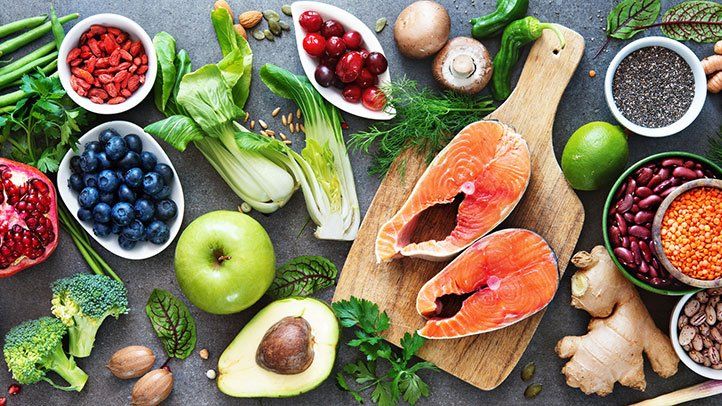Have a Mediterranean-style nutrition
There is increasing evidence that a Mediterranean-style food intake reduces the risk of having difficulty becoming pregnant and may improve the chance of pregnancy using treatment.
What is Mediterranean-style nutrition? Include lots of vegetables, fruit, liquid vegetable oils, fish, beans/legumes, nuts, seeds, poultry and lower-fat dairy products. Minimise processed foods, refined carbohydrates, sugary drinks, treat foods, and have red meat less often. While the relationship between nutrition and fertility is still being studied, following this dietary pattern is great for our overall health anyway.

Eat breakfast, lunch and dinner each day
Don’t panic about your meals needing to be perfectly balanced – a piece of fruit, some yoghurt or a couple of slices of brown toast are all better than skipping a meal or buying something less healthy.
Choose lots of wholegrain carbohydrate foods – these are great for B-vitamins and dietary fibre. Unless you have Coeliac disease or are trailing a low FODMAP diet (diet low in fermentable carbs) then you do not need gluten-free foods.
Eat plenty of fruit and vegetables
Fruit and vegetables give us loads of vitamins, antioxidants and fibre. Aim for at least two handfuls of fruits and three handfuls of coloured vegetables per day - more is better!
- You don't need to buy organic fruit and vegetables – just always wash them thoroughly.
- Frozen vegetables are an excellent choice, and often much cheaper than buying fresh.
- Canned fruit and vegetables are also good, but aim for low sugar/low salt varieties and look for BPA-free cans where possible.
- Choose plenty of colourful vegetables with your main meals; the vitamin C in these will increase your iron absorption.
- Choose pieces of fruit rather than fruit juice. Juice contains the same high level of sugar as soft drink and you miss out on the fibre.
Choose lean protein
Most Malaysians eat plenty of protein, and it’s unlikely that you’ll need more while having fertility treatment. Choose a mixture of animal and vegetarian proteins for a well-balanced intake.
Oily fish is our best source of long-chain omega-3 fats which are excellent for our fertility and overall health. Include two servings of oily fish each week, such as salmon, tuna, sardines, or mackerel. From a mercury perspective, most fish and seafood varieties commonly eaten in Malaysia (including canned tuna) are safe at around 3-4 servings per week.
Red meat is the richest source of easily absorbable iron but also contains saturated fats. Choose small portions, lean cuts and have 2-3 servings of red meat per month. If you are low in iron, choose red meat at least twice per week.
If you follow a vegetarian or vegan intake, make sure you consume a variety of legumes (such as chickpeas, beans and lentils), tofu/tempeh, nuts and seeds. Chia seeds, walnuts, flaxseeds/linseeds are a good source of vegetarian/vegan omega-3 fats.
Keep your calcium intake up
Dairy products are our main source of calcium and a good source of protein too. Reduced-fat dairy products are usually higher in calcium and protein than standard products, and lower in saturated fat. Check the sugar content for yoghurts and aim for unsweetened varieties where possible. If you prefer flavoured yoghurt, choose one with less than 8-9g sugar/100g of yoghurt (check the nutritional panel).
Reduced fat cow's milk dairy products are excellent from a nutritional perspective. If you are lactose intolerant or avoiding cow’s milk for any reason, the best substitute is fortified soy milk. Rice, oat, almond and coconut milks contain minimal protein and calcium; make sure to choose calcium-fortified products if you prefer to use these varieties. Most lactose intolerant people will be able to eat regular yoghurt and cheese without issue as these products are much lower in lactose.
Cheese is high in saturated fat, and doesn’t contain as much calcium or protein as milk and yoghurt. Keep serving sizes small and avoid double-cream varieties.
Non-dairy sources of calcium include broccoli, leafy green vegetables, almonds, chia and sesame seeds, dried fruit, beans and lentils, and tinned fish with bones.

Switch from saturated to unsaturated fat
Saturated fat is not good news for fertility; these types of fat are pro-inflammatory. Most of the saturated fat in the Asian diets comes from meat fat, chicken skin, takeaways, pastry-based items, butter, high-fat dairy products and processed snack foods (e.g. baking, crisps and chocolate).
Unsaturated fats are anti-inflammatory and are very good for us. Food sources of unsaturated fats include nuts, seeds, oily fish, avocado and liquid plant oils. Keep portions small for weight control.
Avoid caffeine and alcohol
Coffee and alcohol are a big part of life; making changes to your intake might feel difficult.
Despite this, avoiding alcohol and limiting caffeine is important as these drinks have been shown to decrease fertility in both sexes in some studies. Many people wait until their treatment begins before cutting back, but it is beneficial to start well in advance (at least several months prior to treatment).
Common sources of caffeine are coffee, tea, green tea, cola and energy drinks.
Cocoa-containing food and drinks (chocolate, drinking chocolate) also contain caffeine but only a small amount.
One cup of regular coffee or tea per day is unlikely to have a negative effect on your fertility, but choose decaffeinated/caffeine-free varieties for the rest of your drinks over the day. Limit alcohol as much as possible for both men and women, and women should stop alcohol completely at embryo transfer.
Water and reduced-fat milk are the healthiest drinks.
Take a folic acid supplement
There is no need to take lots of nutritional supplements during or prior to fertility treatment; if you consume a wide range of foods then you should have adequate amounts of vitamins, minerals and fibre. Nutrients are generally better absorbed from food than capsules.
The exception is folic acid; women need to be taking 800mcg/day (also called 0.8mg) of folic acid for at least 4 weeks prior to fertility treatment and for the first 12 weeks of pregnancy. Some women need higher levels of folic acid – your doctor will advise you if you need more.
There is no evidence that omega-3 fish oil or B-vitamin supplements make a change to fertility status; aim to get these instead from oily fish and wholegrain carbohydrates which we know are great for us.
Ensure you have enough iron and selenium
Women with low iron should make specific dietary changes, and take a combined iron and vitamin C supplement.
Many couples tend to have low selenium intake. One to two Brazil nuts per day will meet your daily requirement while leafy greens, sesame seeds, sunflower seeds, meat, chicken, eggs and seafood are also good sources.

